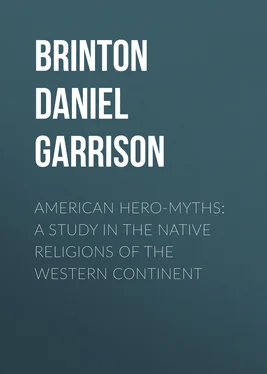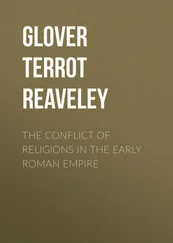Daniel Brinton - American Hero-Myths - A Study in the Native Religions of the Western Continent
Здесь есть возможность читать онлайн «Daniel Brinton - American Hero-Myths - A Study in the Native Religions of the Western Continent» — ознакомительный отрывок электронной книги совершенно бесплатно, а после прочтения отрывка купить полную версию. В некоторых случаях можно слушать аудио, скачать через торрент в формате fb2 и присутствует краткое содержание. Жанр: foreign_prose, История, Мифы. Легенды. Эпос, foreign_edu, foreign_antique, на английском языке. Описание произведения, (предисловие) а так же отзывы посетителей доступны на портале библиотеки ЛибКат.
- Название:American Hero-Myths: A Study in the Native Religions of the Western Continent
- Автор:
- Жанр:
- Год:неизвестен
- ISBN:нет данных
- Рейтинг книги:4 / 5. Голосов: 1
-
Избранное:Добавить в избранное
- Отзывы:
-
Ваша оценка:
- 80
- 1
- 2
- 3
- 4
- 5
American Hero-Myths: A Study in the Native Religions of the Western Continent: краткое содержание, описание и аннотация
Предлагаем к чтению аннотацию, описание, краткое содержание или предисловие (зависит от того, что написал сам автор книги «American Hero-Myths: A Study in the Native Religions of the Western Continent»). Если вы не нашли необходимую информацию о книге — напишите в комментариях, мы постараемся отыскать её.
American Hero-Myths: A Study in the Native Religions of the Western Continent — читать онлайн ознакомительный отрывок
Ниже представлен текст книги, разбитый по страницам. Система сохранения места последней прочитанной страницы, позволяет с удобством читать онлайн бесплатно книгу «American Hero-Myths: A Study in the Native Religions of the Western Continent», без необходимости каждый раз заново искать на чём Вы остановились. Поставьте закладку, и сможете в любой момент перейти на страницу, на которой закончили чтение.
Интервал:
Закладка:
One difficulty encountered in Aryan mythology is extremely rare in America, and that is, the adoption of foreign names. A proper name without a definite concrete significance in the tongue of the people who used it is almost unexampled in the red race. A word without a meaning was something quite foreign to their mode of thought. One of our most eminent students [2] [ Footnote 2 : J. Hammond Trumbull, On the Composition of Indian Geographical Names , p. 3 (Hartford, 1870).] [ Footnote 3 : "El ser existente de hombre, que es el modo de estar el primer ser que es la essentia que en Dios y los Angeles y el hombre es modo personal." Diego Gonzalez Holguin, Vocabvlario de la Lengva Qqichua, o del Inca; sub voce, Cay . (Ciudad de los Reyes, 1608.)] [ Footnote 4 : Franco, Noticia de los Indios Guaymies y de sus Costumbres , p. 20, in Pinart, Coleccion de Linguistica y Etnografia Americana . Tom. iv.] [ Footnote 5 : Sir George W. Cox, An Introduction to the Science of Comparative Mythology and Folk-Lore , p. 17.] [ Footnote 6 : Sir George W. Cox, Ibid. , p. 76.] [ Footnote 7 : See Dr. C.P. Tiele, History of the Egyptian Religion , pp. 93, 95, 99, et al.] [ Footnote 8 : "Τον εμον Χιτωνα ουδεις απεχαλυφεν ον εγω χαρπον ετεχαν, ηλιος εγενετο." (Greek: Ton emon chitona oudeis apechaluphen on ego charpon etechan, aelios egeneto.)]" Proclus, quoted by Tiele, ubi suprá, p. 204, note.]
has justly said: "Every Indian synthesis–names of persons and places not excepted–must preserve the consciousness of its roots, and must not only have a meaning, but be so framed as to convey that meaning with precision, to all who speak the language to which it belongs." Hence, the names of their divinities can nearly always be interpreted, though for the reasons above given the most obvious and current interpretation is not in every case the correct one.
As foreign names were not adopted, so the mythology of one tribe very rarely influenced that of another. As a rule, all the religions were tribal or national, and their votaries had no desire to extend them. There was little of the proselytizing spirit among the red race. Some exceptions can be pointed out to this statement, in the Aztec and Peruvian monarchies. Some borrowing seems to have been done either by or from the Mayas; and the hero-myth of the Iroquois has so many of the lineaments of that of the Algonkins that it is difficult to believe that it was wholly independent of it. But, on the whole, the identities often found in American myths are more justly attributable to a similarity of surroundings and impressions than to any other cause.
The diversity and intricacy of American mythology have been greatly fostered by the delight the more developed nations took in rhetorical figures, in metaphor and simile, and in expressions of amplification and hyperbole. Those who imagine that there was a poverty of resources in these languages, or that their concrete form hemmed in the mind from the study of the abstract, speak without knowledge. One has but to look at the inexhaustible synonymy of the Aztec, as it is set forth by Olmos or Sahagun, or at its power to render correctly the refinements of scholastic theology, to see how wide of the fact is any such opinion. And what is true of the Aztec, is not less so of the Qquichua and other tongues.
I will give an example, where the English language itself falls short of the nicety of the Qquichua in handling a metaphysical tenet. Cay in Qquichua expresses the real being of things, the essentia ; as, runap caynin , the being of the human race, humanity in the abstract; but to convey the idea of actual being, the existentia as united to the essentia , we must add the prefix cascan , and thus have runap-cascan-caynin , which strictly means "the essence of being in general, as existent in humanity." [3] [ Footnote 3 : "El ser existente de hombre, que es el modo de estar el primer ser que es la essentia que en Dios y los Angeles y el hombre es modo personal." Diego Gonzalez Holguin, Vocabvlario de la Lengva Qqichua, o del Inca; sub voce, Cay . (Ciudad de los Reyes, 1608.)] [ Footnote 4 : Franco, Noticia de los Indios Guaymies y de sus Costumbres , p. 20, in Pinart, Coleccion de Linguistica y Etnografia Americana . Tom. iv.] [ Footnote 5 : Sir George W. Cox, An Introduction to the Science of Comparative Mythology and Folk-Lore , p. 17.] [ Footnote 6 : Sir George W. Cox, Ibid. , p. 76.] [ Footnote 7 : See Dr. C.P. Tiele, History of the Egyptian Religion , pp. 93, 95, 99, et al.] [ Footnote 8 : "Τον εμον Χιτωνα ουδεις απεχαλυφεν ον εγω χαρπον ετεχαν, ηλιος εγενετο." (Greek: Ton emon chitona oudeis apechaluphen on ego charpon etechan, aelios egeneto.)]" Proclus, quoted by Tiele, ubi suprá, p. 204, note.]
I doubt if the dialect of German metaphysics itself, after all its elaboration, could produce in equal compass a term for this conception. In Qquichua, moreover, there is nothing strained and nothing foreign in this example; it is perfectly pure, and in thorough accord with the genius of the tongue.
I take some pains to impress this fact, for it is an important one in estimating the religious ideas of the race. We must not think we have grounds for skepticism if we occasionally come across some that astonish us by their subtlety. Such are quite in keeping with the psychology and languages of the race we are studying.
Yet, throughout America, as in most other parts of the world, the teaching of religious tenets was twofold, the one popular, the other for the initiated, an esoteric and an exoteric doctrine. A difference in dialect was assiduously cultivated, a sort of "sacred language" being employed to conceal while it conveyed the mysteries of faith. Some linguists think that these dialects are archaic forms of the language, the memory of which was retained in ceremonial observances; others maintain that they were simply affectations of expression, and form a sort of slang, based on the every day language, and current among the initiated. I am inclined to the latter as the correct opinion, in many cases.
Whichever it was, such a sacred dialect is found in almost all tribes. There are fragments of it from the cultivated races of Mexico, Yucatan and Peru; and at the other end of the scale we may instance the Guaymis, of Darien, naked savages, but whose "chiefs of the law," we are told, taught "the doctrines of their religion in a peculiar idiom, invented for the purpose, and very different from the common language." [4] [ Footnote 4 : Franco, Noticia de los Indios Guaymies y de sus Costumbres , p. 20, in Pinart, Coleccion de Linguistica y Etnografia Americana . Tom. iv.] [ Footnote 5 : Sir George W. Cox, An Introduction to the Science of Comparative Mythology and Folk-Lore , p. 17.] [ Footnote 6 : Sir George W. Cox, Ibid. , p. 76.] [ Footnote 7 : See Dr. C.P. Tiele, History of the Egyptian Religion , pp. 93, 95, 99, et al.] [ Footnote 8 : "Τον εμον Χιτωνα ουδεις απεχαλυφεν ον εγω χαρπον ετεχαν, ηλιος εγενετο." (Greek: Ton emon chitona oudeis apechaluphen on ego charpon etechan, aelios egeneto.)]" Proclus, quoted by Tiele, ubi suprá, p. 204, note.]
This becomes an added difficulty in the analysis of myths, as not only were the names of the divinities and of localities expressed in terms in the highest degree metaphorical, but they were at times obscured by an affected pronunciation, devised to conceal their exact derivation.
The native tribes of this Continent had many myths, and among them there was one which was so prominent, and recurred with such strangely similar features in localities widely asunder, that it has for years attracted my attention, and I have been led to present it as it occurs among several nations far apart, both geographically and in point of culture. This myth is that of the national hero, their mythical civilizer and teacher of the tribe, who, at the same time, was often identified with the supreme deity and the creator of the world. It is the fundamental myth of a very large number of American tribes, and on its recognition and interpretation depends the correct understanding of most of their mythology and religious life.
Читать дальшеИнтервал:
Закладка:
Похожие книги на «American Hero-Myths: A Study in the Native Religions of the Western Continent»
Представляем Вашему вниманию похожие книги на «American Hero-Myths: A Study in the Native Religions of the Western Continent» списком для выбора. Мы отобрали схожую по названию и смыслу литературу в надежде предоставить читателям больше вариантов отыскать новые, интересные, ещё непрочитанные произведения.
Обсуждение, отзывы о книге «American Hero-Myths: A Study in the Native Religions of the Western Continent» и просто собственные мнения читателей. Оставьте ваши комментарии, напишите, что Вы думаете о произведении, его смысле или главных героях. Укажите что конкретно понравилось, а что нет, и почему Вы так считаете.







![Hubert Bancroft - The Native Races [of the Pacific states], Volume 5, Primitive History](/books/749157/hubert-bancroft-the-native-races-of-the-pacific-s-thumb.webp)



![Hubert Bancroft - The Native Races [of the Pacific states], Volume 1, Wild Tribes](/books/750126/hubert-bancroft-the-native-races-of-the-pacific-s-thumb.webp)
